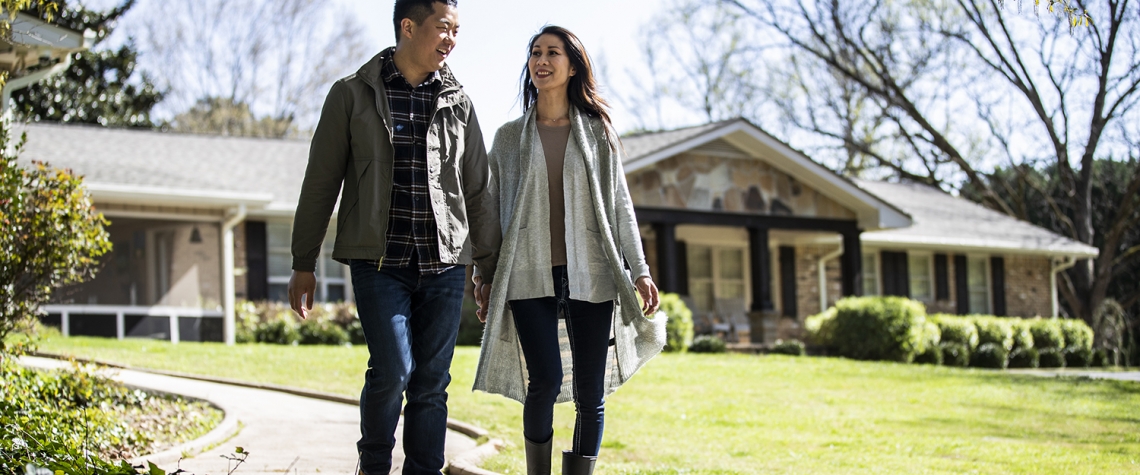
Hidden Money in Your House – Understanding, Building, and Accessing Home Equity
If you own a home, building home equity — the value of your home minus what you owe on your mortgage — is an important long-term strategy for building wealth. That’s because home equity is a resource you can borrow against to pay off debt or make investments that help your money grow. With this in mind, you may be wondering how much equity you have in your home, how you can access it, and how you can use it to build your financial future.
What Is Your Equity?
Equity is the difference between any current liens (mortgage and home equity loans and lines of credit) against your home and what your home is currently worth. The simple math equation looks like this:
Current Value of Your Home – Current Liens = Equity
If your home is worth $250,000 and you owe $150,000 on your mortgage, you have $100,000 in equity.
Because homes generally increase in value over time, the more that you pay down your mortgage, the greater the equity. Over time, there are many ways that you can take advantage of the equity in your home.
- Equity is considered an asset and counts toward your total net worth.
- When you sell your home, your equity allows you to make a walk away with money in your pocket.
- Equity can be cashed out in a loan refinance or borrowed against as collateral. You can use the available funds to pay down debt, renovate, or buy a second home or income property.
Smart Ways to Build Home Equity
Every time that you make your regular mortgage payment, you’re building equity. However, if you want to accelerate the process, you can take these steps.
- Pay Down Your Principal- If your budget allows, try paying a little extra each month and earmark that payment to go toward your principal. Options include making an extra lump-sum payment per year, switching to biweekly payments, or rounding up your payment.
- Own Your Home Five Years or More- While the real estate market can fluctuate from year to year, the longer you stay in your home, the greater the potential to see an increase in value. Also, when you first start paying your mortgage, you’ll be paying more toward the interest than the principal. The longer you stay in your home and make your mortgage payments, the more principal you’ll pay off and the more equity you’ll build.
- Renovate- You can help boost your home’s value by keeping your home in good repair and making strategic improvements. While the kinds of renovations that add value vary from area to area, most realtors agree that improving curb appeal, opening up floor plans, and making cosmetic improvements to kitchens and bathrooms provide the greatest return on investment.
How to Use Your Home Equity
Once you’ve built up equity, how can you use it? You could simply sell your home and cash out, or you can use one of these methods to draw on the equity while staying where you are.
- Home Equity Loans*- A home equity loan works like a second mortgage. Say you have $50,000 in equity. You might qualify for a home equity loan of $35,000. You receive the loan in a single payment, which you can use however you want. You then pay back the loan in monthly installments, with interest, just like your mortgage.
- Home Equity Line of Credit (HELOC)*- A HELOC works similar to a credit card, with your credit limit based on the equity in your home. As you repay the outstanding balance, your available credit is replenished. You also have the flexibility to draw as much or as little as you need during the draw period. You can use a HELOC to finance home renovations or take advantage of the low interest rate to consolidate and pay off high-interest credit card debt.
- Cash-Out Refinance*- In a cash-out refinance, you refinance your mortgage for an amount that is equal to more than your current mortgage balance. The “cash out” amount goes to you in a lump sum payment and is yours to use as you see fit. You then repay the refinanced total in monthly payments with interest, like you do for your original mortgage.
- Reverse Mortgage- Reverse mortgages are increasingly popular with those 62 and older. A reverse mortgage allows you to borrow against the value of your home. That borrowed amount can come to you as a one-time payment or a series of regular payments. That money can be used to pay for medical expenses, home repairs, or to supplement income. However, when you die, sell the home, or no longer live in the home as your principal residence, that loan, plus fees and interest, has to be repaid by you or your heirs.
Before considering any strategy involving your home equity, call us at (877) 773-6605 so we can help you understand each approach’s benefits and challenges.
* With all financing options, the actual amount of equity you can borrow against may be limited to certain percentage of the value of your home based on specific program criteria
